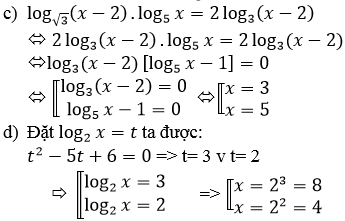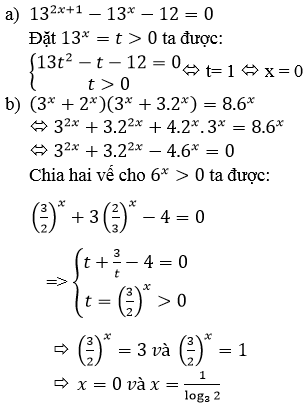Hãy nhập câu hỏi của bạn vào đây, nếu là tài khoản VIP, bạn sẽ được ưu tiên trả lời.

a) Đặt t = 13x > 0 ta được phương trình:
13t2 – t – 12 = 0 ⇔ (t – 1)(13t + 12) = 0
⇔ t = 1 ⇔ 13x = 1 ⇔ x = 0
b)
Chia cả hai vế phương trình cho 9x ta được phương trình tương đương
(1+(23)x)(1+3.(23)x)=8.(23)x(1+(23)x)(1+3.(23)x)=8.(23)x
Đặt t=(23)xt=(23)x (t > 0) , ta được phương trình:
(1 + t)(1 + 3t) = 8t ⇔ 3t2 – 4t + 1 = 0 ⇔ t∈{13,1}t∈{13,1}
Với t=13t=13 ta được nghiệm x=log2313x=log2313
Với t = 1 ta được nghiệm x = 0
c) Điều kiện: x > 2
Vì nên phương trình đã cho tương đương với:
[log3(x−2)=0log5x=1⇔[x=3x=5[log3(x−2)=0log5x=1⇔[x=3x=5
d) Điều kiện: x > 0
log22x – 5log2x + 6 = 0
⇔(log2x – 2)(log2x – 3) = 0
⇔ x ∈ {4, 8}

a) Tập xác định của hàm số là :
\(D=\left(-\infty;-4\right)\cup\left(4;+\infty\right)\)
b) Tập xác định của hàm số là :
\(D=\left(1;+\infty\right)\)
c) Hàm số xác định khi và chỉ khi \(\begin{cases}x^2-3x+2\ge0\\\sqrt{x^2-3x+2}+4-x\ge1^{ }\end{cases}\) \(\Leftrightarrow\) \(x\le1\) V \(x\ge2\)
Tập xác định là \(D=\left(-\infty;1\right)\cup\left(2;+\infty\right)\)
d) Hàm số xác định khi và chỉ khi
\(\begin{cases}\left|x-3\right|-\left|8-x\right|\ge0\\x-1>0\\\log_{0,5}\left(x-1\right)\le0\\x^2-2x-8>0\end{cases}\) \(\Leftrightarrow\) \(\begin{cases}\left(x-3\right)^2\ge\left(8-x\right)^2\\x>1\\x-1\ge1\\x<-2,x>4\end{cases}\) \(\Leftrightarrow\)\(x\ge\frac{11}{2}\)
Vậy tập xác định là \(D=\left(\frac{11}{2};+\infty\right)\)

Điều kiện \(\begin{cases}x\ne1\\x>\frac{1}{2}\end{cases}\)
\(\log_3\left(x-1\right)^2+\log_{\sqrt{3}}\left(2x-1\right)=2\Leftrightarrow2\log_3\left|x-1\right|+2\log_3\left(2x-1\right)=2\)
\(\Leftrightarrow\log_3\left|x-1\right|\left(2x-1\right)=\log_33\)
\(\Leftrightarrow\left|x-1\right|\left(2x-1\right)=3\)
\(\frac{1}{2}\)<x<1 và \(2x^2-3x+4=0\)
hoặc x>1 và \(2x^2-3x-2=0\)
\(\Leftrightarrow x=2\) thỏa mãn điều kiện. Vậy x=2

a. \(y=\left(3^x-9\right)^{-2}\)
Điều kiện : \(3^x-9\ne0\Leftrightarrow3^x\ne3^2\)
\(\Leftrightarrow x\ne2\)
Vậy tập xác định là \(D=R\backslash\left\{2\right\}\)
b. \(y=\sqrt{\log_{\frac{1}{3}}\left(x-3\right)-1}\)
Điều kiện : \(\log_{\frac{1}{3}}\left(x-3\right)-1\ge0\Leftrightarrow\log_{\frac{1}{3}}\left(x-3\right)\ge1=\log_{\frac{1}{3}}\frac{1}{3}\)
\(\Leftrightarrow0< x-3\le\frac{1}{3}\)
\(\Leftrightarrow3< x\le\frac{10}{3}\)
Vậy tập xác định \(D=\) (3;\(\frac{10}{3}\)]
c. \(y=\sqrt{\log_3\sqrt{x^2-3x+2}+4-x}\)
Điều kiện :
\(\log_3\sqrt{x^2-3x+2}+4-x\ge0\Leftrightarrow x^2-3x+2+4-x\ge1\)
\(\Leftrightarrow\sqrt{x^2-3x+2}\ge-x-3\)
\(\Leftrightarrow\begin{cases}x-3< 0\\x^2-3x+2\ge0\end{cases}\) hoặc \(\begin{cases}x-3\ge0\\x^2-3x+2\ge\left(x-3\right)^2\end{cases}\)
\(\Leftrightarrow\left[\begin{array}{nghiempt}x\le1\\2\le x< 3\\x\ge3\end{array}\right.\) \(\Leftrightarrow\left[\begin{array}{nghiempt}x\le1\\x\ge2\end{array}\right.\)
Vậy tập xác định là : D=(\(-\infty;1\)]\(\cup\) [2;\(+\infty\) )

14.
\(log_aa^2b^4=log_aa^2+log_ab^4=2+4log_ab=2+4p\)
15.
\(\frac{1}{2}log_ab+\frac{1}{2}log_ba=1\)
\(\Leftrightarrow log_ab+\frac{1}{log_ab}=2\)
\(\Leftrightarrow log_a^2b-2log_ab+1=0\)
\(\Leftrightarrow\left(log_ab-1\right)^2=0\)
\(\Rightarrow log_ab=1\Rightarrow a=b\)
16.
\(2^a=3\Rightarrow log_32^a=1\Rightarrow log_32=\frac{1}{a}\)
\(log_3\sqrt[3]{16}=log_32^{\frac{4}{3}}=\frac{4}{3}log_32=\frac{4}{3a}\)
11.
\(\Leftrightarrow1>\left(2+\sqrt{3}\right)^x\left(2+\sqrt{3}\right)^{x+2}\)
\(\Leftrightarrow\left(2+\sqrt{3}\right)^{2x+2}< 1\)
\(\Leftrightarrow2x+2< 0\Rightarrow x< -1\)
\(\Rightarrow\) có \(-2+2020+1=2019\) nghiệm
12.
\(\Leftrightarrow\left\{{}\begin{matrix}x-2>0\\0< log_3\left(x-2\right)< 1\end{matrix}\right.\)
\(\Leftrightarrow\left\{{}\begin{matrix}x>2\\1< x-2< 3\end{matrix}\right.\)
\(\Rightarrow3< x< 5\Rightarrow b-a=2\)
13.
\(4^x=t>0\Rightarrow t^2-5t+4\ge0\)
\(\Rightarrow\left[{}\begin{matrix}t\le1\\t\ge4\end{matrix}\right.\) \(\Rightarrow\left[{}\begin{matrix}4^x\le1\\4^x\ge4\end{matrix}\right.\)
\(\Rightarrow\left[{}\begin{matrix}x\le0\\x\ge1\end{matrix}\right.\)

a. \(y=\sqrt[3]{1-x}\) có tập xác định \(x\in R\)
b. \(y=\log_3\left(x^2-3x\right)\)
Điều kiện : \(x^2-3x>0\Leftrightarrow\left[\begin{array}{nghiempt}x< 0\\x>0\end{array}\right.\)
\(\Leftrightarrow\) TXĐ \(D=\left(-\infty;0\right)\cup\left(3;+\infty\right)\)
c. \(y=\log_{x^2-4x+4}2013\)
Điều kiện : \(\begin{cases}x^2-4x+4>0\\x^2-4x+4\ne1\end{cases}\)\(\Leftrightarrow\begin{cases}\left(x-2\right)^2>0\\x^2-4x+3>0\end{cases}\)
\(\Leftrightarrow\begin{cases}x\ne2\\x\ne1\\x\ne3\end{cases}\)
Vậy tập xác định là \(D=R\backslash\left\{1;2;3\right\}\)




